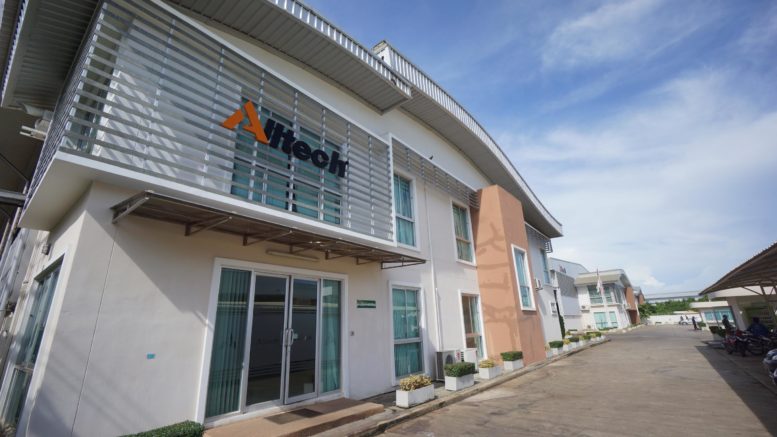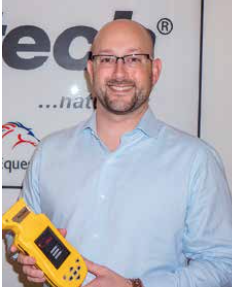
Matt Einarson
ALLTECH is looking to boost its production capacity in Southeast Asia by building a new production facility in 2019, according to Matt Einarson, regional director for Thailand, Vietnam, Cambodia and the Philippines.
The investment will be aimed at keeping up with market demand in the region, especially now that Vietnam and the Philippines are showing sustained, robust growth.
Outside of China and India, Alltech currently operates two facilities in Vietnam and Thailand. The Thailand facility supplies the local market and exports a further 20% of total production.
All facilities operate under the stringent Alltech Quality standard (AQS) while the trace mineral manufacturing plants comply to an additional Q+ program, a proprietary safety protocol assuring consistent quality and product safety.
So far, Alltech’s turnover growth in major markets in Southeast Asia has surpassed 20% per year.
“The future for Alltech in South East Asia is bright”, said Mr. Einarson.
“When we look at macro trends in agriculture, Alltech’s ACE principle, which is using research to innovate natural technologies that improve the health and performance of the animal, while being beneficial to the consumer and at the same time safe for the environment, provides an excellent growth platform in the face of changing consumer demands and government policy”.
Mr Einarson expects vigorous growth in the Philippine market to continue. Nevertheless, Alltech’s marketing team is closely following the repercussions of bird flu and how the crisis is being handled.
Growth in Vietnam is slower than expected due to pork oversupply in the first three quarters of 2017 that has led to a structural revamp and a steep decline in the hog population. The market has begun to pick up in Q4.
Markets in Thailand are well balanced and expected to show steady but modest growth, he said.
Alltech is set to open a new commercial office in Phnom Penh in November to serve its developing business interests in Cambodia. So far, turnover in the country is growing at 20% per year, he added.
Safe feed, nutritious food
He stressed that one of Alltech’s key marketing strategies is to work closely with customers to come up with customized solutions to problems rather than simply expanding product lines.
As a technology company, Alltech takes research very seriously and has formed alliances with many globally renowned researchers.
“Why? Alternative technologies which yield efficiency or performance enhancement require proof,” he said.
For example, Alltech Thailand is looking into solutions to improve pork meat quality by reducing drip loss, pale colour, pH and more.
It is also working with the Dairy Farming Promotion Organization to improve overall cow health and milk quality through improved feeding systems and better
forage. Alltech is also joining forces with universities to run commercial trials.
“We anticipate the ruminant feeding program is going to revolutionize dairy feeding practices in Thailand,” he said. In addition to animal science, the company is conducting trials in crop science with universities in Thailand.
He emphasized that Organic Trace Mineral Nutrition (OTM), a process pioneered by Alltech, has made a positive contribution to environmental protection efforts because improved bioavailability in feed reduces the damaging effects of wasted minerals in the soil and water from manure.
Services reinforcement
Alltech Thailand recently launched a new mobile mycotoxin testing unit capable of testing for five major mycotoxins. The test takes around 10 minutes per toxin.
Earlier this year, it introduced a mobile egg testing unit operated by Alltech’s technical service team for performing egg quality analysis for customers on site. The testing covers eggshell quality and hardness, yolk colour and haugh unit.
DHA fortification
Using algae derivatives as alternatives to fish oil also helps the environment by reducing pressure on ocean fisheries, he said, noting that fish oils are currently the most prominent dietary sources of long-chain fatty acids such as eicosapentaenoic acid (EPA) and docosahexaenoic acid (DHA).
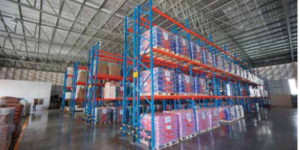
Warehouse (2064 sq m) contains 700 tonnes of nished goods on selective racks
The three types of Omega-3s involved in human physiology are alphainolenic acid (ALA), EPA and DHA.
“It’s the ratio between these three that promote the health benefits we all associate with Omega-3s. However, only DHA can be obtained through the consumption of fish oils, meat/milk/eggs, and algae. Regularly, animal diets do not contain DHA because plant material isn’t a viable source. Supplementing the diet with algae that has a high level of DHA resolves this issue, allowing for increased tissue levels as well as improvements in the health and performance of the animal,” said Mr Einarson.
Securing the supply chain
Having a local production base reduces importation risks. It also enables Alltech to ensure best quality and offer more flexibility, he said.
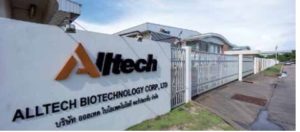
Alltech’s manufacturing plant
Alltech’s current facility located in the Bangkok Free Trade Zone has been up and running since mid-2015. The plant produces 4,000 tonnes/year of mostly organic minerals along with a smaller percentage of enzymes and acidifiers.
All inbound materials are tested for heavy metal contaminants, PCBs, dioxins and more, as well as for mycotoxins that might have become co-mingled with carrier ingredients. Outbound finished goods also undergo rigorous testing.
“We want to be sure that all products are produced at the highest quality possible,” Mr Einarson said.
Capacity utilization at the plant has surpassed 80%. It is operating three, eight-hour shifts per day and closes on Sundays for maintenance. Each shift employs 10 workers.
Its goal is to keep downtime below 2% per day with 0% lost time due to accidents.
Praphan Hansanukrom, plant manager Alltech Thailand , said the plant is certified for ISO 22000:2005, Food safety management system as well as FAMI-Qs (European standard) operating procedures and also complies to Alltech’s prescribed health and safety procedures which are on par with SHE–Safety Health and Environment. Workplace hazards have been identified to virtually eliminate the risk of accidents and exposure to harmful substances.
The production building and lab has 1,600 sq m of working space. The nearby raw material and finished goods warehouses have a total space of 2,000 sq m.
The raw material warehouse keeps enough inventory to last 40 days. Also, in case of unexpected situations, the plant has potential to procure goods from the closest alternate production source, thus enabling a steady supply for customers.
Quality control
Incoming raw materials, procured through an Approved Supplier program, undergo rigorous testing for desired parameters and contaminants at the Alltech Quality Laboratory in China. Trace mineral purity checks and heavy metal contaminants are tested using Inductively Coupled Plasma (ICP) technology.
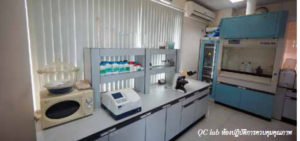
QC lab
Trace Minerals, under the Q+ program, undergo further analysis of PCBs (polychlorinated biphenyls) and dioxin testing at a globally approved 3rd party lab. The permissible limit of acceptance is below 0.35 ng/kg (or parts per trillion) for PCBs and 0.5 ng/kg for dioxins . The Q+ program conducts evaluations twice at the raw material stage and at the finished good stage, thereby ensuring complete safety of the product.
Core products manufactured in Bangkok are organic trace minerals under the brand name Bioplex®, single organic trace minerals such as Fe, Mn, Zn, Cu and Mg as well as combined formulations that are species-specific.
Organic trace minerals are chelated with peptides under controlled pH, temperature, moisture and time, and dried using a fluidized bed drier and sieve to create uniform particle size. All parameters and measurements during production are tracked and analyzed to ensure all technical requirements are met for quality consistency and productivity.
The drying system is uniquely chosen to obtain a free-flowing, dust-free, slightly granular product, taking care of the health of the operators and enabling a cleaner work environment.
The plant can also blend powders using concentrates obtained from the parent company with a one-tonne ribbon mixer (mixing CV <5%) for mixing compound organic trace minerals, yeast-based and enzyme products. A 500-kg capacity unit can blend liquid products.
The company uses the latest enterprise resource planning (ERP) solutions. Microsoft Dynamics AX software man- ages the business and core functionalities of nance, production, quality, logistics and inventory control. This comprehen- sive software is also a great tool for cus- tomer service, master scheduling, budget planning, supply-to-demand evaluation and subsequent forecasting, he added.
As a part of its continuous improvement program, Alltech is applying for ISO 17025 accreditation for its QC lab by 2020.

